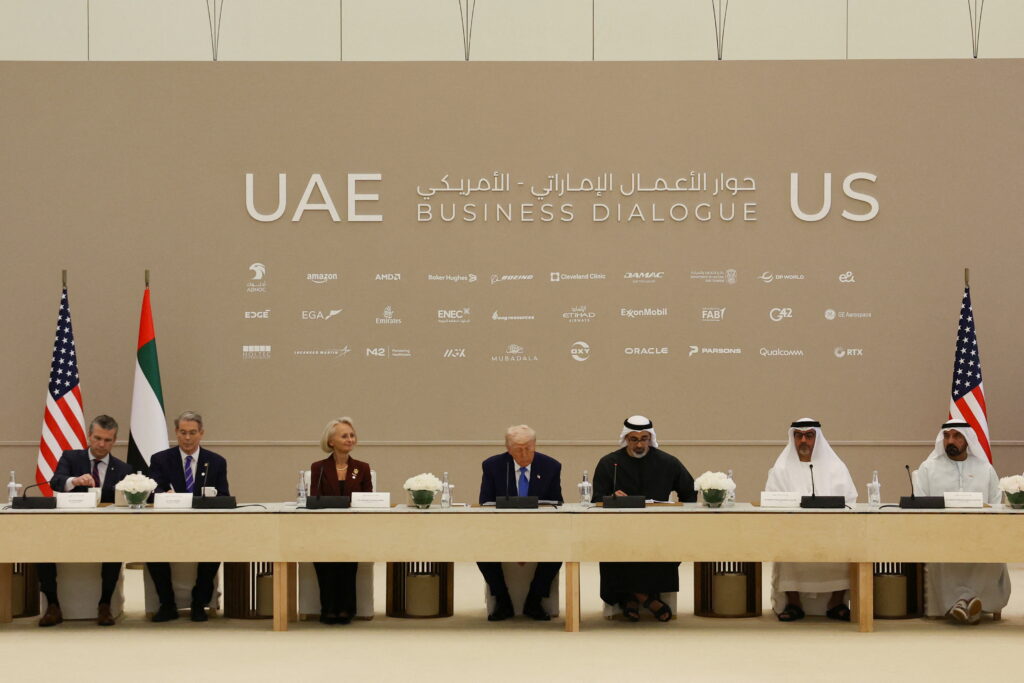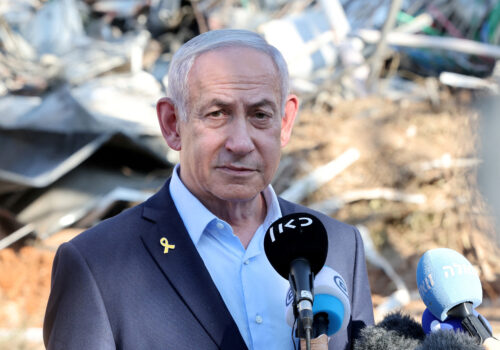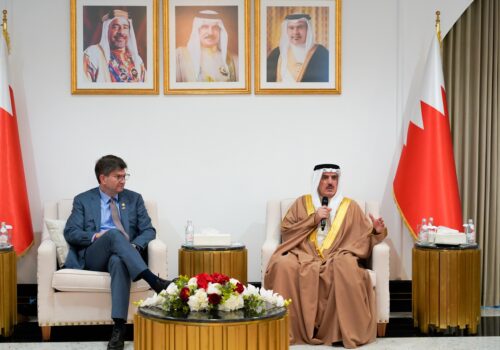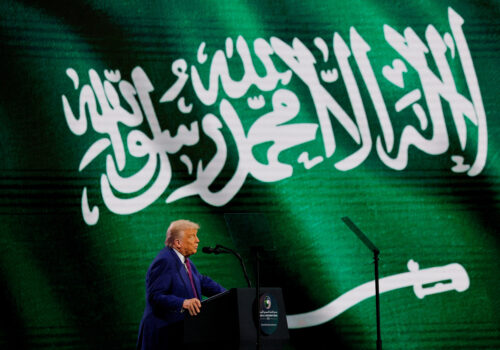Israel and Iran’s Twelve Day War saw Gulf states contemplating contingency plans, as they reckoned with the possibility of a conflict that could destroy their carefully built model of connectivity, tourism, and logistics.
Gulf states have invested heavily in courting the US President Donald Trump’s administration through business deals, with the aim of expanding their diplomatic and geopolitical leverage in moments when their safety and stability are at stake.
And although tensions with Iran remain, Gulf leaders were clearly shocked by Israel’s attacks and Iran’s ensuing counter-strikes, which unfolded as the Gulf led and hosted diplomatic talks between Washington and Tehran.
Their desire to shift the regional narrative toward economic and technological development remains hindered by conflict. While Gulf states have weathered the setbacks suffered by an expansive and aggressive regional hegemon like Iran since the October 7, 2023, Hamas attacks that launched the region into chaos, they fear that getting caught in the crossfire of a major war would be catastrophic.
While a fragile ceasefire is in place, unity among some Gulf capitals in collective defense appears evident, and they are mobilizing to reinstate confidence and continue building on their “business first” model.
Risks to the connectivity model
Major cities in the region, like Doha and Dubai, now serve as one of the leading global air traffic hubs that bridge East and West, and would be among the first victims of an enduring escalation between Israel and Iran.
Dubai is the world’s busiest airport, while Doha ranks tenth.
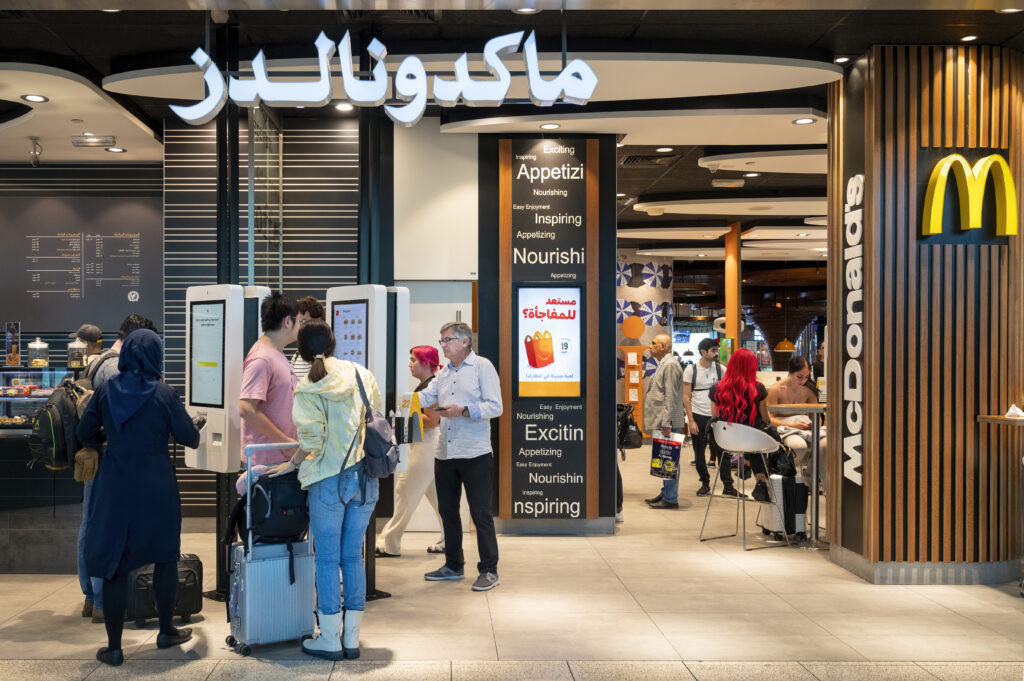
Doha’s Hamad International Airport lies just 180 miles from Bushehr Province, a hub for Iranian ballistic missiles and home to its Sixth Tactical Airbase. Dubai’s International Airport is even closer, at only about 120 miles from mainland Iran, specifically the port city of Bandar Abbas, home to Iran’s main naval base and additional missile assets.
In 2024, only 22 percent of passengers traveling through Doha had Qatar as their final destination, highlighting the strategic importance of the region to global air traffic, the geographical vulnerability of some Gulf states vis-à-vis Iran, and how conflict could paralyze global aviation and trigger mass evacuations from the large expatriate population.
SIGN UP FOR THIS WEEK IN THE MIDEAST NEWSLETTER
The region’s expatriate workforce comprises approximately half of the total Gulf population and more than 80 percent of its workforce, with around thirty million individuals across Bahrain, Kuwait, Oman, Qatar, Saudi Arabia, and the United Arab Emirates (UAE). The latest escalation revived fears about safety and future uncertainty, adding urgency to the Gulf leaders’ argument that sustained conflict has become a burden on their economic visions. Past episodes of tension speak to this: in 2009, the UAE saw a collapse in business confidence due to US-Iran tensions over Iran’s ballistic missiles test and concerns over escalating nuclear activity, triggering failed real estate projects, an exodus of expatriates, and a significant decline in tourism, according to the World Economic Forum report.
Another geopolitical toll of escalation in the Gulf impacts maritime security: Gulf ports and shipping lanes are vital to the region’s ambitions to lead global trade and tech supply chains. War risk insurance premiums for shipments to the Middle East have already jumped from .02 percent to 0.5 percent as of June 23.
Is a post-nuclear Iran better for Gulf regional ambitions?
Even if Iran is weakened through regime change, Gulf countries may find themselves constrained by Israel—with its unmatched tech sector, military edge, and nuclear capabilities— which could emerge as the new de facto power in the region, something that Gulf leaders, despite warming ties with Jerusalem, are unlikely to accept without any pushback.
The critical question is whether a weakened Iran and a dominant Israel benefit Gulf ambitions—or whether an ongoing diplomatic impasse keeps both actors in check and stuck in a zero-sum competition for regional dominance, thereby giving the Gulf more room to rise. Now that at least a temporary ceasefire between Israel and Iran has been achieved, Gulf leaders must emphasize their role as indispensable actors in bringing about peace and economic prosperity. Gulf countries are unique in being US allies and maintaining good relations with Iran. With Tehran’s nuclear program now apparently set back, the Gulf now has a once-in-a-generation opportunity to further assert its regional leadership.
The Gulf hosts around forty thousand US service members. Al-Udeid Air Base in Qatar, which Tehran recently targeted, hosts around ten thousand; Bahrain’s Fifth Fleet headquarters hosts around nine thousand.
Having visited both and spoken directly with service members stationed there, I have heard firsthand how these two bases play a central role in maintaining day-to-day regional security and building mutual trust with Washington’s Gulf allies, including the countering of Iranian and Houthi missile and drone threats.
The fragile ceasefire and the vulnerability of the rogue regime in Tehran will continue to keep Gulf states preoccupied, since internal instability and a potential regime change may further destabilize their “business first” approach. The Gulf states’ geographic proximity to Iran and their understanding of the cultural, historical, and social nuances that bind the region and its people remain indispensable in this moment of peril, as they forge a regional security architecture with lasting guarantees.
What are Gulf commentators saying?
In a recent Atlantic Council-led bipartisan congressional delegation to the Gulf, local policymakers expressed privately their desire to continue expanding their relationship with Israel while also voicing concerns over Iran’s nuclear ambitions. However, Gulf policymakers also warned that Israel, under the current government of Prime Minister Benjamin Netanyahu, cannot be allowed to become the next source of instability. Other analysts argued that states in the Gulf are concerned that they do not know what strategic goals are motivating Israeli actions, or what the end game is, and what it means for them going forward.
Saudi Journalist Abdulrahman al-Rashed argued that Israeli efforts to target Iran’s supreme leader could ignite centuries-long grievances and dangerous ideological resentment towards Israel and the US due to his symbolic stature. Others, such as former senior National Security Council official Steven N. Simon, believe that the eventual removal of the Iranian regime would be in the long-term security interests of the region.
Mohammed Baharoon, Director General of the Dubai-based think tank B’huth, warned that a dominant Israel “will have very limited space in a region that seeks economic partnerships over security alliances.” This reflects a wider sentiment and regional ambition to move beyond perpetual conflict and fully develop into the economic powerhouse the region has been aspiring to be.
Kuwaiti analyst Bader Al Saif argued that the US now needs to “apply real leverage,” and pursue talks with Iran regardless of Israel’s stance, just like it did with the Houthis. Hassan Alhasan, a Bahraini analyst, echoed that all of the ingredients for protracted conflict remain entrenched—Iran is still very much intent on nuclear capabilities, and Israel shows little signs of restraint. “Without such a sustainable deal in place,” he warned, “everything is in place for us to see a repeat of what’s happened over the past two years.”
Nevertheless, it is worth noting that Israel is a key provider of cybersecurity tools to several countries of the Gulf—cooperation that has deepened over shared concerns about Iran’s cyber threats.
The Gulf’s balancing act for primacy has an uphill battle
Public demonstrations of rapprochement between Arab capitals and Israel are likely to remain restrained in the short term as Gulf capitals seek to renegotiate their relations with Iran to protect economic interests, even as cooperation behind closed doors deepens. Nevertheless, a weakened Iran, along with a Gulf outreach to Tehran that offers incentives and guarantees, paired with quiet cooperation with Israel, could raise the Gulf’s strategic positioning as a mediator and ensure neither power becomes too dominant in regional affairs. The interests of Gulf leaders seem to point towards maintaining a close but constrained relationship with Israel, and a weak but stable one with Iran, for them to emerge as the indispensable middle power leaders of the region.
Yet, competition between influential Gulf countries could certainly impact a unified Gulf position to rise to the occasion in a post-nuclear Iran environment. However, Saudi Arabia under Crown Prince Mohammed bin Salman, may well be able to rise to the occasion on its own, and intensify its pursuit of regional leadership in a post-nuclear Iran order—while clashing with other regional heavyweights like the UAE.
Seizing the moment to lead
After Trump’s strategic and consequential decision to neutralize or delay Iran’s nuclear program, the subsequent Israel-Iran ceasefire announced by the US president seems to be holding. Washington appears once again aligned with Gulf priorities, having announced a new round of talks with Iran. As Holly Dagres at the Washington Institute points out, the fight over Iran’s nuclear program isn’t over—and as the Islamic Republic’s point of pride, it is unlikely to be abandoned.
The US administration would need to find a middle ground between the Gulf and Israel. However, ultimately, for a US president with a business-first mindset, the Gulf represents the new business frontier in his global hierarchy, making the synergy with Gulf capitals even stronger. Just weeks ago, Qatar, the UAE, and Saudi Arabia secured major wins, over $2 trillion, for both the Gulf and the United States during Trump’s visit to the region, particularly in cutting-edge artificial intelligence (AI) and technology infrastructure.
Gulf leaders must continue to seize this moment to lead, secure further concessions from Iran and Israel, define a clear end goal, and anchor a broader diplomatic solution. A more peaceful Middle East can only be built with and co-led by Gulf capitals—alongside the United States—whose economic and prosperity visions for the region make them uniquely positioned to steer it away from further conflict.
The next move from the Gulf will be shaped by three key imperatives: securing their business interests, reaffirming the Gulf’s collective security, and preserving their role as the East-West connecting hub of future global trade and emerging technologies. These goals grant the region hope in turning to a new chapter of Gulf power, where the region shapes, not only takes part in, the evolving global order. By doing so, Gulf capitals would be able to secure their position as bridge builders. As the UAE’s assistant minister for political affairs and envoy of the Minister of Foreign Affairs, Lana Nusseibeh notes, “no ‘iron wall’ strategy can ever bring full victory to any one country or people.”
Joze Pelayo is an associate director at the Atlantic Council’s Scowcroft Middle East Security Initiative, where he manages the China-Middle East and the US-Gulf security cooperation portfolios.
Further reading
Mon, Jul 7, 2025
Opportunity knocks on Netanyahu’s US visit after Israel-Iran war
MENASource By Shalom Lipner
Prevailing circumstances—albeit fraught with barriers—present the opportunity for all sides to declare victory.
Tue, Jun 24, 2025
Dispatch from the Gulf: Finding middle ground amid Israel-Iran war
MENASource By Allison Minor
Congressional delegation visit coincided with Israel and Iran squaring off in a direct military confrontation.
Fri, May 23, 2025
The Gulf is emerging as Washington’s new strategic anchor
MENASource By Joze Pelayo
The so-called US “Golden Age for the Gulf” is one rooted in strategic utility, equal footing, high-stake deals, and fewer strings.
Image: U.S. President Donald Trump and Crown Prince of Abu Dhabi Sheikh Khaled bin Mohamed bin Zayed Al Nahyan attend a business forum at Qasr Al Watan during the final stop of his Gulf visit, in Abu Dhabi, United Arab Emirates, May 16, 2025. REUTERS/Amr Alfiky
